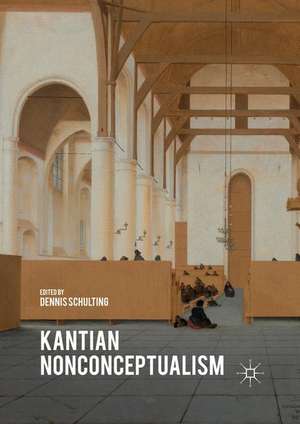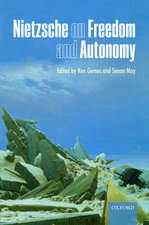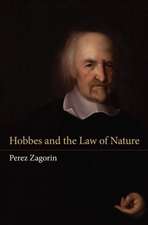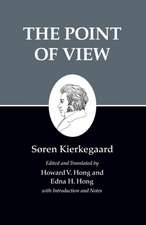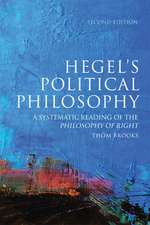Kantian Nonconceptualism
Editat de Dennis Schultingen Limba Engleză Paperback – 20 mai 2019
His idealism aside, Kantian nonconceptualism is the most topical contemporary issue in Kant’s theoretical philosophy. In this collection of specially commissioned essays, major players in the current debate, including Robert Hanna and Lucy Allais, engage with each other and with the broader literature in the field addressing all the important aspects of Kantian nonconceptualism. Among other topics, the authors analyse the notion of intuition and the conditions of its generation, Kant’s theory of space, including his pre-Critical view of space, the relation between nonconceptualism and the Transcendental Deduction, and various challenges to both conceptualist and nonconceptualist interpretations of Kant. Two further chapters explore a prominent Hegelian conceptualist reading of Kant and Kant’s nonconceptualist position in the Third Critique. The volume also contains a helpful survey of the recent literature on Kant and nonconceptual content.
Kantian Nonconceptualism provides a comprehensive overview of recent perspectives on Kant and nonconceptual content, and will be a key resource for Kant scholars and philosophers interested in the topic of nonconceptualism.
| Toate formatele și edițiile | Preț | Express |
|---|---|---|
| Paperback (1) | 527.48 lei 43-57 zile | |
| Palgrave Macmillan UK – 20 mai 2019 | 527.48 lei 43-57 zile | |
| Hardback (1) | 701.40 lei 43-57 zile | |
| Palgrave Macmillan UK – 4 ian 2017 | 701.40 lei 43-57 zile |
Preț: 527.48 lei
Preț vechi: 620.56 lei
-15% Nou
Puncte Express: 791
Preț estimativ în valută:
100.93€ • 105.65$ • 84.01£
100.93€ • 105.65$ • 84.01£
Carte tipărită la comandă
Livrare economică 31 martie-14 aprilie
Preluare comenzi: 021 569.72.76
Specificații
ISBN-13: 9781349710225
ISBN-10: 1349710229
Pagini: 320
Ilustrații: XXVI, 322 p.
Dimensiuni: 148 x 210 mm
Greutate: 0.42 kg
Ediția:1st ed. 2016
Editura: Palgrave Macmillan UK
Colecția Palgrave Macmillan
Locul publicării:London, United Kingdom
ISBN-10: 1349710229
Pagini: 320
Ilustrații: XXVI, 322 p.
Dimensiuni: 148 x 210 mm
Greutate: 0.42 kg
Ediția:1st ed. 2016
Editura: Palgrave Macmillan UK
Colecția Palgrave Macmillan
Locul publicării:London, United Kingdom
Cuprins
Key to Abbreviations of Cited Works.- Note on Contributors.- Introduction: Dennis Schulting.- 1. Conceptualism and Nonconceptualism in Kant: A Survey of the Recent Debate: Lucy Allais.- 2. Why the Transcendental Deduction is Compatible with Nonconceptualism: Sacha Golob.- 3. On the Relation of Intuition to Cognition: Anil Gomes & Andrew Stephenson.- 4. Sensible Synthesis and the Intuition of Space: Stefanie Grüne.- 5. Directions in Space, Nonconceptual Form, and the Foundations of Transcendental Idealism: Robert Hanna.- 6. Kant’s Aesthetic Nonconceptualism: Dietmar Heidemann.- 7. Moderate Conceptualism and Spatial Representation: Thomas Land.- 8. Getting Acquainted with Kant: Colin McLear.- 9. Is There Room for Nonconceptual Content in Kant’s Critical Philosophy?: Christian Onof.- 10. On an Older Dispute: Hegel, Pippin, and the Separability of Concept and Intuition in Kant: Dennis Schulting.- 11. The Difference Between Original, Metaphysical, and Geometrical Representations of Space: Clinton Tolley.- References.- Index.
Notă biografică
Dennis Schulting is former Assistant Professor of Metaphysics and its History at the University of Amsterdam and obtained his PhD in Philosophy from the University of Warwick, England, in 2004. He specialises in Kant and German Idealism. He has published in leading journals such as the Philosophical Review, Kantian Review, Kant-Studien, and Kant Yearbook, and has contributed essays to multiple book volumes. He is the author of two monographs on Kant’s Transcendental Deduction: Kant’s Deduction and Apperception: Explaining the Categories (Palgrave Macmillan, 2012) and the forthcoming Kant’s Radical Subjectivism: Perspectives on the Transcendental Deduction (Palgrave Macmillan). He is also the editor of The Bloomsbury Companion to Kant (2nd ed; Bloomsbury, 2015) and co-editor of Kant’s Idealism: New Interpretations of a Controversial Doctrine (Springer, 2011).
Textul de pe ultima copertă
This book offers an array of important perspectives on Kant and nonconceptualism from some of the leading scholars in current Kant studies. As well as discussing the various arguments surrounding Kantian nonconceptualism, the book provides broad insight into the theory of perception, philosophy of mind, philosophy of mathematics, epistemology, and aesthetics.
His idealism aside, Kantian nonconceptualism is the most topical contemporary issue in Kant’s theoretical philosophy. In this collection of specially commissioned essays, major players in the current debate, including Robert Hanna and Lucy Allais, engage with each other and with the broader literature in the field addressing all the important aspects of Kantian nonconceptualism. Among other topics, the authors analyse the notion of intuition and the conditions of its generation, Kant’s theory of space, including his pre-Critical view of space, the relation between nonconceptualism and the Transcendental Deduction, and various challenges to both conceptualist and nonconceptualist interpretations of Kant. Two further chapters explore a prominent Hegelian conceptualist reading of Kant and Kant’s nonconceptualist position in the Third Critique. The volume also contains a helpful survey of the recent literature on Kant and nonconceptual content.
Kantian Nonconceptualism provides a comprehensive overview of recent perspectives on Kant and nonconceptual content, and will be a key resource for Kant scholars and philosophers interested in the topic of nonconceptualism.
His idealism aside, Kantian nonconceptualism is the most topical contemporary issue in Kant’s theoretical philosophy. In this collection of specially commissioned essays, major players in the current debate, including Robert Hanna and Lucy Allais, engage with each other and with the broader literature in the field addressing all the important aspects of Kantian nonconceptualism. Among other topics, the authors analyse the notion of intuition and the conditions of its generation, Kant’s theory of space, including his pre-Critical view of space, the relation between nonconceptualism and the Transcendental Deduction, and various challenges to both conceptualist and nonconceptualist interpretations of Kant. Two further chapters explore a prominent Hegelian conceptualist reading of Kant and Kant’s nonconceptualist position in the Third Critique. The volume also contains a helpful survey of the recent literature on Kant and nonconceptual content.
Kantian Nonconceptualism provides a comprehensive overview of recent perspectives on Kant and nonconceptual content, and will be a key resource for Kant scholars and philosophers interested in the topic of nonconceptualism.
Caracteristici
Addresses one of the most important ongoing debates about Kant’s theoretical philosophy Written by researchers at the cutting edge of Kant scholarship, including contributions from Robert Hanna and Lucy Allais Draws an innovative link between the current discussions on the topic and Kant’s third Critique
